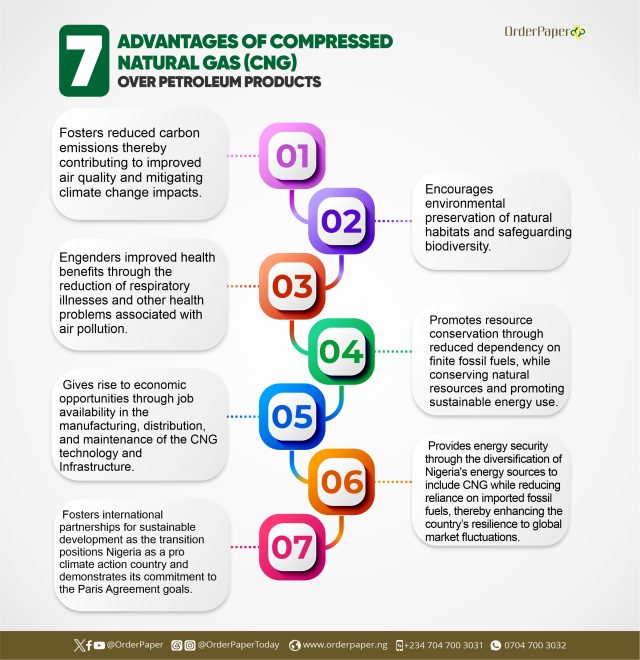In a groundbreaking move toward environmental sustainability, President Tinubu’s directive mandates Ministries and Agencies to transition to CNG-powered vehicles. This bold step signifies a significant shift towards cleaner energy solutions, aiming to reduce carbon emissions and promote a greener future for Nigeria. However, what are the overall implications and the fine lines of this transformative policy change?

In recent years, the world has witnessed a growing concern over environmental issues, particularly the adverse effects of carbon emissions on climate change. In response to this global challenge, governments and organisations around the world are increasingly exploring alternative fuel options to reduce their carbon footprint and promote sustainability. One such alternative gaining traction is Compressed Natural Gas (CNG) as a fuel for vehicles.
CNG, derived primarily from methane, offers several advantages over traditional gasoline and diesel fuels. CNG is natural gas that remains clear, odourless, and non-corrosive; serving as an alternative to petrol. It is compressed to the point where it is lighter than air — usually approximately one percent of its original volume. It is a cleaner-burning fuel, emitting lower levels of harmful pollutants such as carbon dioxide (CO2), nitrogen oxides (NOx), and particulate matter. This reduction in emissions contributes to improved air quality, which is particularly crucial in urban areas where vehicular pollution is a significant concern.
READ ALSO: CNG Buses: Senate Cautions Tinubu against extra-budgetary spending
Furthermore, CNG can be abundant and widely available in Nigeria, as it is extracted from natural gas reserves found underground. Unlike conventional petroleum-based fuels, which are finite resources subject to price fluctuations and geopolitical tensions, natural gas reserves are more abundant and distributed across various regions globally. This accessibility and stability in supply makes CNG a reliable and sustainable fuel option for transportation.
In addition to environmental benefits, the transition to CNG vehicles offers economic advantages. As the global economy shifts towards renewable and sustainable energy sources, investing in CNG infrastructure and technology can stimulate job creation and economic growth. The development of CNG refuelling stations, manufacturing facilities for CNG vehicles, and related industries can generate employment opportunities and drive innovation in the automotive sector.
Moreover, CNG vehicles generally have lower operating costs compared to their gasoline or diesel counterparts. It is over 400 percent cheaper than petrol. The price of natural gas tends to be more stable and less volatile than crude oil, resulting in savings for vehicle owners over the long term. Additionally, CNG engines typically require less maintenance due to cleaner combustion and reduced wear on engine components, further reducing the total cost of ownership.
READ ALSO: TRENDING: Sustainability and Nigeria’s Oil and Gas Industry

Against this backdrop, the announcement by President Tinubu regarding the adoption of CNG vehicles by members of the Federal Executive Council (FEC) and Ministries, Departments, and Agencies (MDAs) marks a significant milestone in Nigeria’s journey towards sustainable development. By prioritising the use of cleaner and domestically sourced fuel for government fleets, the administration demonstrates its commitment to environmental stewardship, energy security, and economic prosperity.
However, for the successful implementation to the general public, careful planning, investment, sensitisation and coordination among various stakeholders is imperative. While CNG produces fewer greenhouse gas emissions and air pollutants compared to gasoline or diesel, it still releases methane during extraction, production, and transportation processes.
Methane is a potent greenhouse gas, and its emissions contribute to climate change, thus the Nation would require proper management structure. Key considerations include the development of CNG infrastructure, including refuelling stations and distribution networks, as well as incentives to encourage private investment and consumer adoption of CNG vehicles.
Additionally, efforts to raise awareness and promote education about the benefits of CNG and sustainable transportation are essential to garner public support and participation.
In conclusion, the transition to CNG vehicles represents a bold and forward-thinking approach to addressing the dual challenges of environmental sustainability and energy security, while also meeting Nigeria’s 2021 Nationally Determined Contribution target to unconditionally reduce emissions 20% below Business As Usual (BAU) by 2030.
By embracing cleaner and domestically abundant fuel options like CNG, Nigeria can reduce its dependence on imported petroleum products, mitigate vehicular emissions, and pave the way for a greener and more sustainable future.



